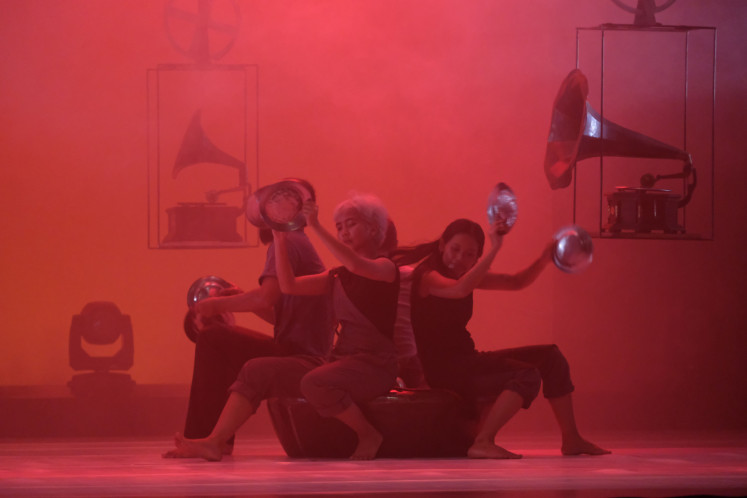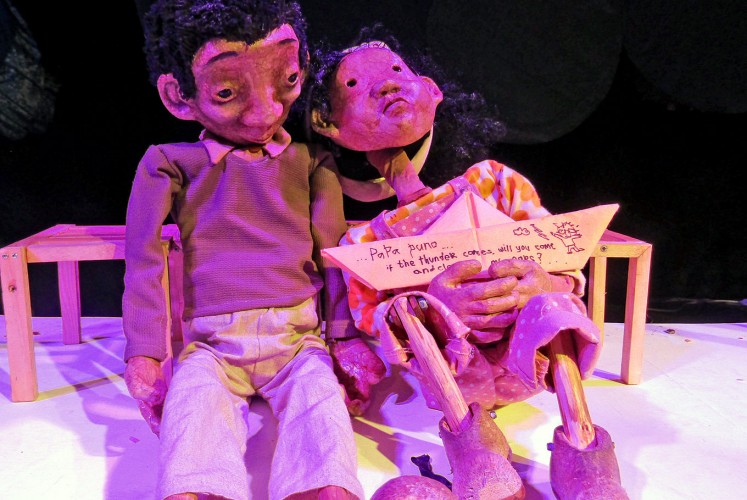Popular Reads
Top Results
Can't find what you're looking for?
View all search resultsPopular Reads
Top Results
Can't find what you're looking for?
View all search results2018 in review: A year of theatrical experiments
Indonesian theatrical troupes played with technology and soundscapes to deliver spectacular shows.
Change text size
Gift Premium Articles
to Anyone
A
t a glance, Teater Koma seemed to follow a familiar formula for its 154th production in November, centering on the Mahabharata Hindu epic and supported by a strong cast wearing period costumes. But there was something visually refreshing about Mahabarata: The Love Story of the King of the Gods.
It was accompanied by a video narration and three-dimensional animation was projected onto the stage in many scenes. It was a fiery and dark underworld in one scene, and another scene played out against the animated background of an opulent kingdom.
The animated visuals were a huge leap for the usually traditionalist Teater Koma, which turned 41 this year.
The man behind the play was Norbertus “Nano” Rintiarno, one of the 12 founders of Teater Koma, who has a bold vision for attracting millennials to the theater.
He first tried his new idea with Gemintang back in July. Tapping into the popularity of the sci-fi genre among the youth, Nano penned and directed an interstellar love story set in a foreign yet familiar nation where corruption reigns supreme.
Nano’s strategy seems to be working. The two productions attracted many young theatergoers — thanks in part to the Jakarta administration, which had booked one performance of each show for high school students.
“From my observation, around 95 percent of the audience, including the young, love the new approach,” Nano told The Jakarta Post.
“Thus, we will feature animation and video projections in next year’s productions,” he said, adding that the theatrical troupe was preparing sequels to Mahabarata: Love Story and Gemintang.
Inventiveness is not exclusive to Teater Koma. The Yogyakartan artists collective, Teater Garasi, also made waves with its immersive, sonic theatrical experience, Gong Ex Machina.
Gong ex machina by Teater Garasi (JP/Jerry Adiguna)The brainchild of Japanese sound designer Yasuhiro Morinaga and prominent theatrical artist Yudi Ahmad Tajudin evoked different feelings by artfully immersing the audience into 600 different sounds, including sirens and recordings of historical speeches played on a gramophone.
Innovative performances aside, Bunga Penutup Abad (The Flower that Ends a Century) shone in its third annual season, mostly using the same formula as before.
The play, based on the first two volumes of Pramoedya Ananta Toer’s Buru Quartet, featured the same starring actors — excepting Marsha Timothy, who took over the role of Dutch concubine Nyai Ontosoroh from Happy Salma who remained in the producer’s chair.
Bunga became the talk of the town, thanks to the cast’s excellent performance and star power, particularly Reza Rahadian.
The past year has also shown us the healing power of theater.
It was through a play that Gadjah Mada University (UGM) faced the truth about the 1965 purge of alleged members and sympathizers of the now-defunct Indonesian Communist Party (PKI). In 1966, the university dismissed over 4,000 lecturers, students and administrative staffers for allegedly supporting the PKI.
Thirteen women survivors of the 1965 dismissals performed in Selamatan Anak Cucu Sumilah (A Banquet for Sumilah’s Children and Grandchildren) alongside 30 UGM students and other performers.
The two-hour play, which was performed on campus, features scenes depicting the process of making satay — from suspending the goat to butchering the meat, and to grilling the meat skewers — a subtle metaphor of the various forms of torture that were inflicted on those accused of being PKI supporters. It was likely not easy for the survivors to perform such scenes, but they showed great courage in helping one of the country’s most respected universities to reconcile with its past.
Puno (left) and Tala, two puppets from Papermoon Puppet Theater (JP/Bambang Muryanto)One particular performing arts festival highlighted the artists’ passion for sharing. Ria and Iwan Effendi of Papermoon Puppet Theater made their international puppet biennale in Yogyakarta, Pesta Boneka #6 (Puppet Party), free to the public.
The couple achieved this through fundraising shows as well as funding from the local administration. The funds they raised, however, were not enough to cover the international performers’ transportation costs.
So puppeteers from around the globe paid for their own plane tickets to join the event.
“We were surprised to learn that many local and overseas participants had applied to the biennale,” Ria said. “In the past, we had 12 performers, but this year we had 29 from 16 countries. In total, 85 artists were involved.”
Around 5,000 people attended the three-day Pesta Boneka #6, which also held discussions and workshops in addition to puppet shows. On closing day, the puppeteers held a performance and prepared a feast that they shared with the villagers of Kasihan in Bantul, Yogyakarta.
Last, but certainly not least, 2018 also marked an end to the two-year drought of international musicals in Jakarta. And what better way to herald a new era than a charming musical that makes us move our feet and sing along: Mamma Mia!
Running from Aug. 28 to Sept. 9 at Taman Ismail Marzuki, Central Jakarta, the jukebox musical was written by Catherine Johnson, based on the songs of Swedish pop group ABBA. It became an instant hit after its 1999 London premier and has been touring internationally since the early 2000s.
The unabashedly lively musical got the audience reminiscing with its rendition of ABBA’s greatest hits, from the groovy “Dancing Queen” to the show-stopping “The Winner Takes It All”.
All in all, this has been an eclectic and refreshing year for theatrical performances. Some drama companies took a journey of self-rediscovery and reinvention, while others paid tribute to iconic works through stage adaptations. In Yogyakarta, a group of real-life survivors of one of the country’s darkest hours reclaimed their past by claiming the stage, while puppeteers from across the country and the globe stepped up to share their craft (and food!).
Their approaches and visions may be different, but each gave a performance that experimented with the power of theater to cross generations, to move audiences, to heal, to give and most of all, to spread joy.













